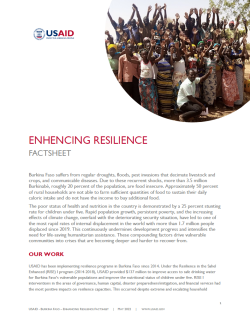
Burkina Faso suffers from regular droughts, floods, pest invasions that decimate livestock and crops, and communicable diseases. Due to these recurrent shocks, more than 3.5 million Burkinabè, roughly 20 percent of the population, are food insecure. Approximately 50 percent of rural households are not able to farm sufficient quantities of food to sustain their daily caloric intake and do not have the income to buy additional food.
The poor status of health and nutrition in the country is demonstrated by a 25 percent stunting rate for children under five. Rapid population growth, persistent poverty, and the increasing effects of climate change, overlaid with the deteriorating security situation, have led to one of the most rapid rates of internal displacement in the world with more than 1.7 million people displaced since 2019. This continuously undermines development progress and intensifies the need for life-saving humanitarian assistance. These compounding factors drive vulnerable communities into crises that are becoming deeper and harder to recover from.
OUR WORK
USAID has been implementing resilience programs in Burkina Faso since 2014. Under the Resilience in the Sahel Enhanced (RISE) I program (2014-2018), USAID provided $137 million to improve access to safe drinking water for Burkina Faso’s vulnerable populations and improve the nutritional status of children under five. RISE I interventions in the areas of governance, human capital, disaster preparedness/mitigation, and financial services had the most positive impacts on resilience capacities. This occurred despite extreme and escalating household exposure to conflict, climatic, and economic shocks.
Based on this success, a second phase, RISE II, was launched to cover the 2018-2023 period with a budget of $190 million for Burkina Faso. The current phase of the RISE program has five objectives.
First, USAID improves the management of natural resources, including access to safe drinking water and secure access to productive land for economic activities. Under this objective, USAID works to reduce the risk of conflicts over natural resources and improve the management of risks and shocks, including climate shocks such as floods and droughts. USAID provides advice and expertise to the Ministry of Health to draft, implement, finance, and enforce policies at the national level for adequate water, sanitation, and hygiene practices in healthcare facilities as well as carrying out complementary activities at the local level with communities in the target areas.
Second, USAID strengthens agriculture market systems in Burkina Faso. To this end, USAID improves the structures and organization of markets, promotes business development and opportunities for youth and women, and strengthens the business environment. To support market actors, USAID works with banks and microfinance institutions to increase Burkinabè farmers’ access to credit. USAID also supports Burkina Faso’s agriculture sector by engaging with the private sector to provide quality inputs and service delivery across three value chains: cowpea, poultry, and small ruminants. Improved market structure and market organization reduce the vulnerability of farmers and supply chain actors to price volatility in local markets.
The third objective is to ensure healthy families by improving family planning, and the health and nutrition of women of reproductive age, pregnant/breastfeeding women, and children under five years of age. USAID also supports efforts to strengthen the national healthcare system so it can provide better services to the people of Burkina Faso.
Fourth, USAID strengthens governance to support a return to democratic government. USAID supports local governments and state institutions to improve transparency, accountability, and the delivery of public services. In addition, USAID supports the development of local community leadership to increase people’s resilience and reduce their vulnerability to recruitment by violent extremists. USAID works with local governments, civil society organizations, and local communities to develop resilience, support decentralized governance, and strengthen ties between farmers and herders to support sustainable livelihoods and resilience to shocks.
The last objective is to help women and youth become more meaningfully integrated in their communities so they can have a stronger voice and be a force for positive change. This includes efforts to increase access to, and control over productive resources, increase their ability to earn a living, improve their health, and be represented in government.
USAID’s Bureau for Humanitarian Assistance also funds multi-year resilience food security activities which align with the RISE II strategy and objectives. These activities work at the community level to provide a foundation upon which agricultural growth, natural resource management, governance, water and sanitation, and other sectors can develop.

